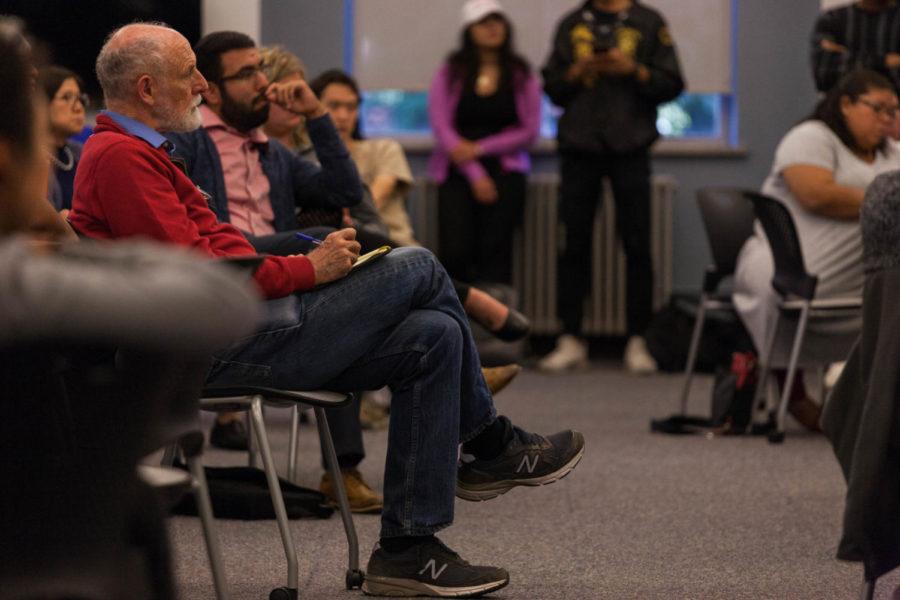“Know Your Rights” forum provides insight on DACA
September 7, 2017
Concerned allies, inquisitive students, faculty, staff members and those impacted filled Room 198 in Parks Library on Thursday afternoon for the “Know Your Rights” Informational Forum. This forum occurred following the decision of President Donald Trump to end Deferred Action for Childhood Arrivals, or DACA, which was put in place through an executive order by former President Barack Obama.
Deferred action is a decision by the Department of Homeland Security to not deport someone. On June 15, 2012, Obama issued the temporary deferred action policy for undocumented children that were brought to the United States by either a parent or caregiver.
DACA is not a pathway for legal and permanent residency or citizenship; it is a temporary relief from deportation for two years. DACA recipients during the two year period are given work and school authorization, meaning the recipients have the opportunity to work and attend school in the United States. The recipients are also able to apply for a social security number and a driver’s license but recipients are not eligible for federal financial aid or public benefits.
Sarahi Trejo, co-president of Latinx Student Initiatives, gave a personal, positive opening remarks at the forum.
“Iowa State has continued to show their support and has encouraged all of us to not lose our hope,” said Trejo in her remarks. “Fight for our little sisters and brothers, fight for our classmates, our friends and neighbors and most importantly fight for those who don’t have a voice.”
A panel consisting of Iowa State faculty, American Civil Liberty Union (ACLU) policy counsel and immigration lawyer for Iowa Justice For Our Neighbors (Iowa JFON).
April Palma, the immigration lawyer for Iowa JFON, said how current DACA recipients’ visas as of Tuesday are still valid. As of Tuesday, there were no more DACA applications being processed. However, Palma said that individuals that have visas expiring between now and March 5 are the only ones who will be able to reapply for renewal. The individuals have one month to reapply and their application for renewal must be submitted by Oct. 5.
“Right now the biggest push is finding all of those people and making sure we get all of their applications in by Oct. 5,” Palma said.
Katharine Johnson Suski, director of admissions, said that the enrollment status won’t change due to the DACA rescinding.
“Students have a right to education in the state of Iowa. If you still meet the requirement to become a resident in the state of Iowa, you still can, that will not change,” Johnson Suski said.
Johnson Suski said that the biggest change that could happen is the availability for DACA students to work on campus because work authorization is needed to work an on-campus job.
Sonia Reyes-Snyder, another panelist and officer for the Latino Affairs for the State of Iowa, encouraged DACA recipients to hire immigration attorneys.
“Anyone who has DACA should go see an attorney immediately,” Reyes-Snyder said.
Daniel Zeno, policy counsel for ACLU, encouraged attendees to write op-ed, contacting local and federal legislators. Zeno also addressed the Dream Act, a piece of legislation introduced by Senators Lindsey Graham and Dirk Durbin and is the only piece of legislation that creates a pathway to citizenship for DACA recipients and other types of immigration recipients.
Zeno encouraged attendees to contact their legislators about the Dream Act and persuade the legislators to vote for the legislative piece.
Selena Pinton, co-president of Latinx Student Alliance, said that having this event was a step in the right direction. Pinton said that she wasn’t surprised by the attendees of the forum.
“I wanted people not affected by this here,” Pinton said.
Pinton hoped to continue the conversations and have more events coming.
“We should bring it to their attention,” Pinton said of those who are not giving much attention to the DACA rescinding and other important issues.
Trejo also agreed with her co-president, wishing that there were more students who weren’t impacted or not as educated on the topic at the forum.
Overall, Trejo was surprised at the outcome of attendance, expecting fewer attendees than there were.
Trejo hopes that she and her student organization can engage more and take action.
“I think it would be a cool experience for my organization if we all could write emails and call our legislators,” Trejo said.
Trejo hopes to collaborate with other student organizations, non-multicultural and multicultural, and for there to be more panels in the near future.
“Don’t lose hope, keep fighting, take action,” Trejo said.







